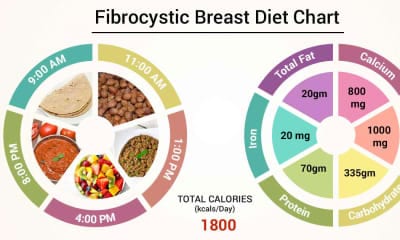Contents
General description of the disease
Mastopathy is a dyshormonal benign oncological disease of the mammary gland, which is characterized by the predominance of the fibrous and / or cystic component in its structure.
Causes of mastopathy
changes in hormonal levels, menstrual irregularities, polycystic ovary disease, thyroid disease, adnexitis, hepatitis, pancreatitis, stress, cholecystitis, intestinal dysbiosis, gastritis, taking hormonal drugs, diet disturbances, lack of labor or late labor, gynecological diseases, lack of regular sexual intercourse life, chronic liver disease, iodine deficiency, pituitary tumor, frequent abortion.
Symptoms of mastitis
Constant or intermittent (premenstrual) pain in the mammary gland, SPMN (premenstrual tension syndrome), nipple discharge (transparent, green, milk, brown) lumps, enlargement or nodules in the mammary gland, enlargement of the axillary lymph nodes.
Useful products for mastopathy
- black bread, bran bread, second-grade flour bread;
- foods with vitamin E (soybean, sunflower and cottonseed oil, sprouted wheat grains, oat grains, wheat groats, legumes, butter, beef, cod, halibut, herring) relieve mastopathy symptoms, reduce breast tenderness, reduce the number and size of cysts;
- unrefined oil (walnut, olive, linseed);
- seafood (shrimp, seaweed, mussels, squid);
- fish (mackerel, salmon, herring, sardines) contains essential iodine and fatty acids;
- beans, green vegetables, stewed and sauerkraut, beans, soy products (contain substances that suppress excessive estrogen activity);
- High-fiber foods (walnuts, hazelnuts, seeds, whole grains, pumpkin, beets, carrots, apples)
- milk and lactic acid products (kefir, yoghurts, acidophilus);
- foods with a high calcium content (sesame, hard cheese, goat cheese, almonds, celery, cottage cheese, dried apricots);
- antioxidant products (beetroot – has a choleretic and bile-forming effect, promotes the liver, which produces some female hormones; broccoli and spinach with vegetable oil – contain natural coenzyme Q10, which activates the antitumor mechanism in the body);
- products with selenium and lycopene (tomatoes, brewer’s yeast, Brazil nuts) promote the absorption of iodine and normalize hormonal levels, protect against the harmful effects of ultraviolet radiation;
- white and green tea contains catechins, which have wound healing and antitumor effects, remove excess sugar and toxins from the body;
- Shiitake mushroom contains lentinan, which stimulates the immune system and prevents the development of mastapathy;
- soy contains natural phytoestrogens, which are similar to female hormones and, if necessary, lower or increase the level of estrogen in the body.
Traditional medicine for mastopathy
- beet compress (grate saturated red small beets (3 parts), honey (1 part), put the mixture on a cabbage leaf) apply for 40 minutes three times a day;
- a mixture of juices (one glass of lemon and black radish juice, carrot, garlic and beetroot juice, cahors and honey, mix in an enamel bowl with a wooden spoon, pour into glass containers, store in the refrigerator) take one tbsp. spoon 3 times a day 30 minutes after eating until the end of the mixture, take a break for one month and repeat the reception, in total spend five courses of admission per year;
- take honey with Kalanchoe juice (1: 1) twice a day;
- garlic oil (50 grams of crushed garlic per 100 grams of unrefined sunflower oil) take one tablespoon on an empty stomach in the morning for 20 days;
- salt compresses (moisten a waffle towel in a nine percent saline solution) apply to the chest for two weeks at night;
- apply fresh leaves of coltsfoot or burdock at night, lubricate the breast and nipples with burdock oil during the day.
Dangerous and harmful products for mastopathy
With mastopathy, it is necessary to exclude from the diet such foods that provoke the development of the disease:
pasta, white bread, semolina, premium flour products; corn oil; fresh white cabbage (binds iodine in the body); saturated fats (margarine, mayonnaise); foods that contain a large amount of carbohydrates (sweets, chocolate, cakes, cookies, pastries) and contribute to the development of breast cysts by increasing the secretion of female sex hormones; coffee, hot chocolate and black tea (caffeine and theobromine increase the activity of the mammary glands); salty and fatty foods, carbonated sweet water.
Attention!
The administration is not responsible for any attempt to use the information provided, and does not guarantee that it will not harm you personally. The materials cannot be used to prescribe treatment and make a diagnosis. Always consult your specialist doctor!










